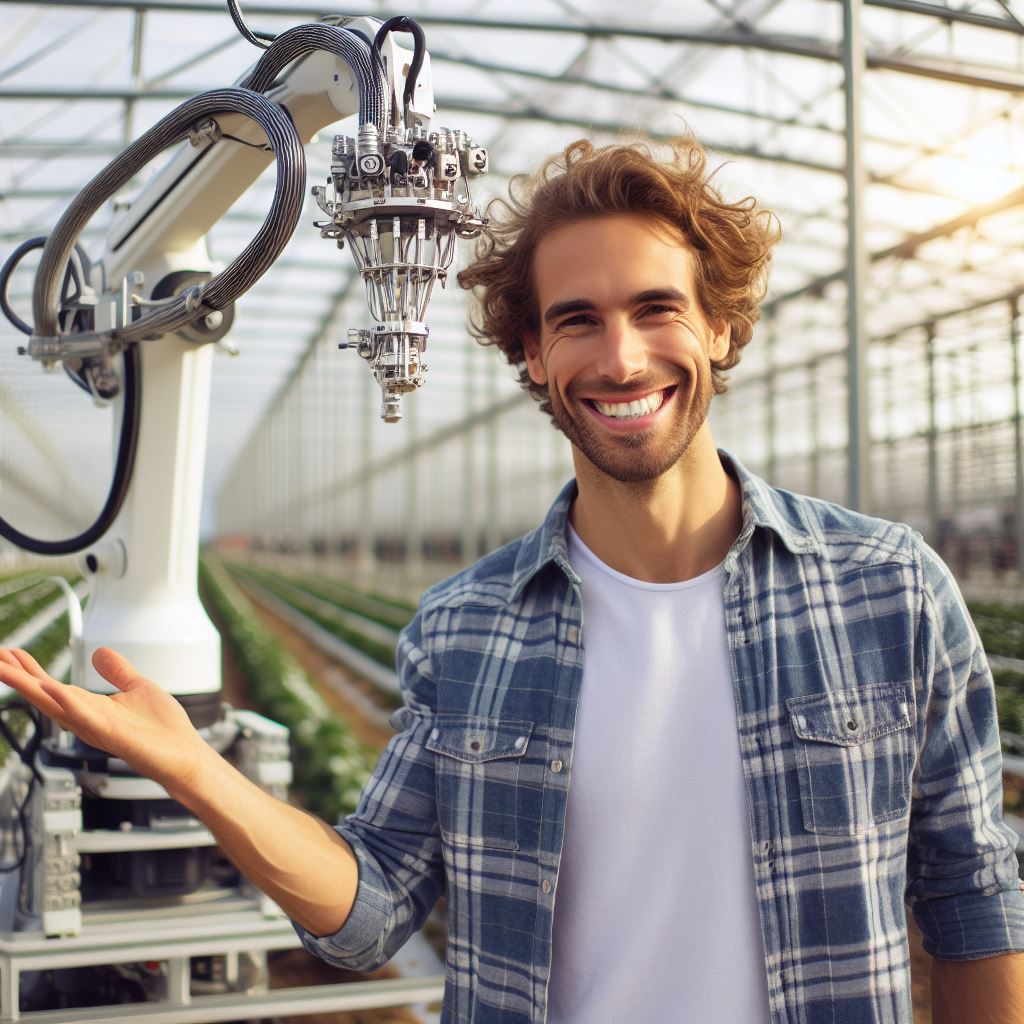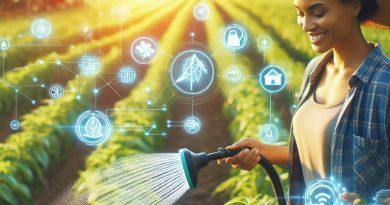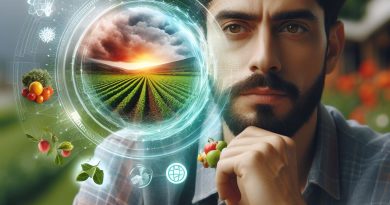AI Role in Modern Farming Techniques
Last Updated on February 22, 2024
Introduction
AI role in modern farming techniques, or artificial intelligence, has become an integral part of modern farming techniques.
It refers to the simulation of human intelligence in machines that are programmed to think and learn like humans.
The journey of AI in the farming industry dates back to the 1980s when it started gaining popularity.
Initially, AI was used for simple tasks such as monitoring weather conditions and predicting crop yields.
Over time, the importance of AI in improving farming practices has significantly increased.
AI-powered technologies like drones and robots can be used for precise and efficient farming operations.
These machines can monitor crop health, detect diseases, and apply fertilizers and pesticides accurately.
Moreover, AI algorithms can analyze vast amounts of data collected from sensors and satellite imagery to provide valuable insights.
Farmers can make data-driven decisions regarding irrigation, fertilization, and crop rotation to optimize yields and minimize resource wastage.
AI also plays a crucial role in reducing the environmental impact of agriculture.
By monitoring soil conditions and plant health in real-time, farmers can implement sustainable farming practices that reduce the use of water, chemicals, and energy.
In fact, AI has revolutionized modern farming techniques by improving efficiency, productivity, and sustainability.
Its ability to process and analyze large amounts of data has empowered farmers to make informed decisions and maximize their yields.
As technology continues to advance, the role of AI in agriculture is only expected to grow, shaping the future of farming.
Benefits of AI in modern farming
Modern farming techniques have been revolutionized by the integration of artificial intelligence (AI), allowing farmers to enhance their efficiency and productivity while minimizing environmental impact.
With the aid of AI, precision agriculture has become a reality, enabling farmers to make more informed decisions and optimize their yield.
Let’s explore the various benefits AI brings to modern farming:
Precision agriculture
- AI-powered drones equipped with advanced sensors gather precise data about crop health and growth.
- This data is analyzed using AI algorithms, enabling farmers to make targeted interventions.
- Farmers can identify areas of their fields that require specific treatments, such as irrigation or fertilization.
- By applying resources only where they are needed, farmers minimize waste and optimize crop production.
- Precision agriculture allows farmers to monitor their crops in real-time, making adjustments as necessary.
Increased efficiency and productivity
- AI-powered machinery, such as autonomous robots, can perform labor-intensive tasks with high precision.
- These machines can selectively harvest crops at the optimal time, maximizing yield and minimizing losses.
- AI algorithms can analyze vast amounts of data, providing valuable insights into crop management.
- Farmers can optimize planting schedules, irrigation strategies, and pest control methods based on AI recommendations.
- By streamlining operations, farmers can increase their overall efficiency and productivity.
Reduction of environmental impact
- AI-powered sensors can detect and identify pests or diseases early, optimizing treatment plans.
- With timely interventions, farmers can reduce the need for pesticides and minimize their environmental impact.
- AI algorithms analyze historical and real-time weather data to optimize irrigation practices.
- By applying water more efficiently, farmers conserve water resources and reduce wastage.
- AI can also help in the development of sustainable farming practices, minimizing the use of harmful chemicals.
Predictive analytics for yield optimization
- AI algorithms can analyze historical data on crop yield, weather patterns, and soil conditions.
- Using this data, predictive models are created to forecast future crop yields.
- Farmers can make data-driven decisions regarding planting strategies and expected harvest volumes.
- Predictive analytics enable farmers to optimize their yield and plan for efficient storage and distribution.
- By minimizing waste and optimizing production, farmers can increase profitability and food availability.
In short, AI plays a vital role in modern farming techniques, offering numerous benefits to farmers and the environment.
Precision agriculture, increased efficiency and productivity, reduction of environmental impact, and predictive analytics are among the significant advantages of integrating AI into farming practices.
As AI continues to advance, the future of farming holds even greater potential for sustainable and high-yield crop production.
Read: CRISPR Crop Edits: Future of Farming Tech
Applications of AI in Modern Farming
Crop Monitoring and Management
1. Automated monitoring systems
AI technology is revolutionizing modern farming practices by introducing automated monitoring systems.
These systems utilize sensors and cameras to collect real-time data on crop growth, soil conditions, and weather patterns.
2. Detection of diseases and pests
AI-powered algorithms can analyze data collected from sensors to detect diseases and pests early on.
This enables farmers to take prompt actions, such as targeted pesticide application or crop rotation, to prevent further damage.
Livestock Management
1. Automated feeding and monitoring
AI-based systems can monitor livestock health and automate feeding processes.
Sensors and cameras installed in the barns can track animals’ behavior, ensuring they receive appropriate nutrition and early identification of any abnormalities.
2. Health monitoring and disease prediction
AI algorithms can analyze data from wearable devices or cameras to detect signs of illness in livestock.
By monitoring vital signs and behaviors, these systems can predict disease outbreaks, allowing farmers to take preventive measures.
Robotic Farming
1. Automated planting and harvesting
Robotic systems equipped with AI technology can perform tasks like planting seeds or harvesting crops more efficiently.
These machines can work tirelessly, offering increased precision and reducing manual labor requirements.
2. Weed and pest control
AI-powered robots can identify and eliminate weeds, reducing the need for herbicides.
These robots use computer vision systems to differentiate between crops and weeds and apply targeted treatments.
Data Analysis and Decision-Making
1. Predictive models for yield forecasting
AI algorithms can analyze vast amounts of data, including historical weather patterns and soil characteristics, to predict crop yields.
This information helps farmers optimize their production plans and make informed decisions.
2. Optimal resource allocation
By analyzing real-time data, AI systems can determine the precise amount of resources needed for irrigation, fertilization, and pest control.
This allows farmers to minimize waste, reduce costs, and achieve higher yields.
In essence, AI technologies have immense potential to transform modern farming.
The applications discussed above demonstrate how AI can revolutionize crop monitoring, livestock management, robotic farming, and data analysis.
With AI, farmers can make more informed decisions, optimize resource allocation, and achieve higher productivity while reducing environmental impact.
As AI continues to develop, it will play an increasingly crucial role in shaping the future of agriculture.
Read: AI & Big Data: Farming’s Future

Challenges and Limitations of AI in Modern Farming
Initial Investment and Infrastructure Requirements
- Implementing AI in modern farming requires a significant initial financial investment.
- The cost of purchasing AI technology, sensors, and other equipment can be prohibitively high.
- Farmers need to upgrade their infrastructure to support AI systems and ensure optimal functioning.
- Improving network connectivity and broadband coverage is essential for seamless AI integration.
- Small-scale farmers may struggle to afford the high upfront costs, hindering adoption.
Data Collection and Management
- AI in farming relies heavily on data collection, which introduces challenges.
- Data needs to be accurate, comprehensive, and reliable for AI systems to make informed decisions.
- Farmers must invest time and resources into gathering the necessary data for AI algorithms.
- Maintaining data integrity and security is crucial to protect farmers’ sensitive information.
- Data management systems need to be scalable and capable of handling vast amounts of information.
Implementing AI in modern farming brings many advantages, ranging from increased productivity and efficiency to improved resource management.
However, it also faces several challenges and limitations that must be addressed.
The initial investment and infrastructure requirements can be a barrier to entry for many farmers, particularly small-scale ones.
Adequate funding and support are crucial to ensure widespread adoption of AI in the agriculture sector.
Additionally, data collection and management pose challenges, requiring farmers to invest time, resources, and expertise into gathering accurate and reliable data.
Robust data management systems are necessary to handle the vast amount of information generated.
Ethical Concerns and Human Intervention
Ethical concerns regarding the use of AI in farming cannot be overlooked.
It is essential to ensure that AI systems align with ethical farming practices, animal welfare, and sustainability goals.
Human intervention and oversight are necessary to make ethical decisions and strike a balance between efficiency and responsible farming.
To overcome these challenges, collaboration between farmers, researchers, policymakers, and technology providers is essential.
Governments can support farmers through subsidies and incentives, making AI technology more accessible.
Research institutions and agricultural organizations can assist in developing robust data management systems and ethical guidelines for AI use in farming.
AI has the potential to revolutionize the agricultural industry and address many of the challenges it currently faces.
By addressing the limitations and challenges discussed in this section, we can pave the way for a future where AI and modern farming techniques work hand in hand, leading to more sustainable and efficient farming practices.
Read: Tech Trends: AI & Crop Management
Future prospects and advancements in AI for farming
The future of farming lies in the hands of Artificial Intelligence (AI) and its integration with other emerging technologies.
With the continuous advancements in machine learning and data analysis, AI has the potential to revolutionize the agricultural sector.
Integration with other emerging technologies
AI can be seamlessly integrated with other emerging technologies such as the Internet of Things (IoT) and drones.
IoT devices can collect real-time data from farms, including soil moisture, temperature, and crop growth.
This data can then be analyzed by AI algorithms to provide actionable insights and automate farming processes.
Drones equipped with AI-powered cameras can capture images of crops, analyze them, and detect diseases or nutrient deficiencies at an early stage.
This enables farmers to take proactive measures and prevent widespread crop damage.
Machine learning for better prediction and optimization
Machine learning algorithms can analyze vast amounts of historical and real-time data to predict crop yields, optimize resource allocation, and determine the best planting and harvesting times.
By considering various factors such as weather patterns, soil quality, and market demand, AI can help farmers make data-driven decisions and maximize their productivity.
AI-powered robots can also assist in tasks such as planting seeds, weeding, and harvesting.
These robots can be programmed to navigate farm fields autonomously, reducing the need for manual labor and increasing efficiency.
Collaboration and knowledge sharing within the industry
AI can facilitate collaboration and knowledge sharing within the farming industry.
Farmers can connect with experts and share their experiences through online platforms powered by AI.
This enables them to learn from each other, access the latest research and best practices, and stay updated with industry trends.
AI can also assist in the transfer of knowledge from experienced farmers to the next generation.
By capturing and analyzing the expertise of experienced farmers, AI algorithms can create virtual mentors that provide guidance and recommendations to novice farmers.
In general, the future of farming is promising with the integration of AI and other emerging technologies.
By harnessing the power of AI, farmers can improve their decision-making process, optimize resource allocation, and achieve higher yields.
Collaboration and knowledge sharing within the industry further enhance the capabilities of AI in transforming modern farming techniques.
It is an exciting time for farmers as they embrace AI as a powerful tool in their quest for sustainable and efficient agricultural practices.
Read: Next-Gen Farming: The Role of Drones
Conclusion
Recap of the importance and benefits of AI in modern farming techniques
AI plays a crucial role in modern farming techniques, revolutionizing the way we cultivate crops and raise livestock.
Its ability to analyze vast amounts of data helps farmers make informed decisions, leading to optimized resource allocation, higher yields, and reduced environmental impact.
Encouragement to embrace AI for improved farming practices
Embracing AI in agriculture is not just a choice but a necessity for farmers who strive for efficiency and sustainability.
By implementing AI-powered solutions, farmers can witness increased productivity, better crop health monitoring, and reduced labor costs.
The collaboration between humans and machines can truly elevate farming practices to new heights.
Future potential of AI to revolutionize the agriculture industry
The future potential of AI in agriculture is promising.
With advancements in machine learning and robotics, AI can enable autonomous farming systems, where robots perform tasks such as planting, weeding, and harvesting.
Furthermore, AI can facilitate precision farming, where every plant receives individual care based on its needs, optimizing resource utilization and minimizing waste.
In review, AI has the power to transform modern farming techniques.
Its importance in agriculture cannot be overstated, as it brings numerous benefits to farmers, consumers, and the environment.
It is in our best interest to embrace AI-driven technologies and unlock the full potential of the agriculture industry for a sustainable and productive future.


